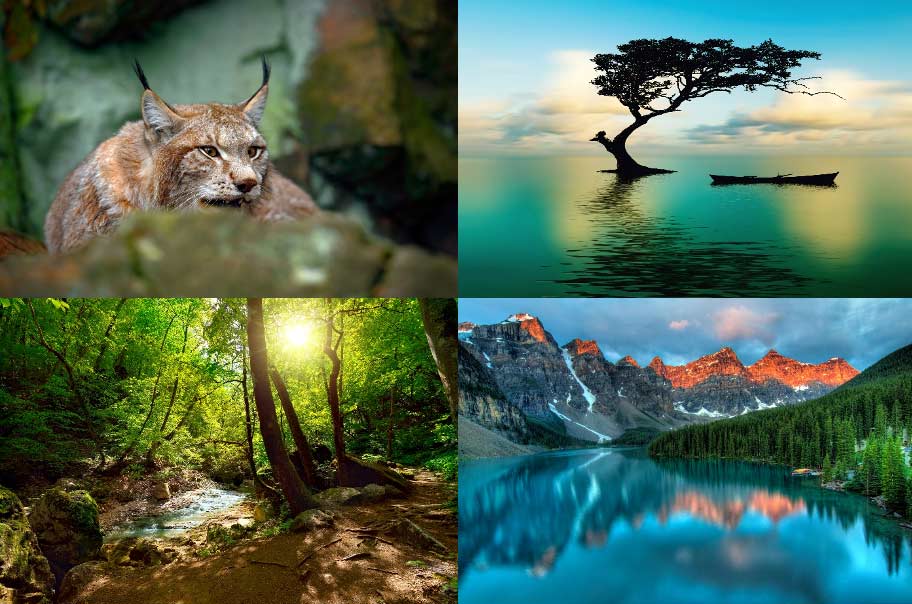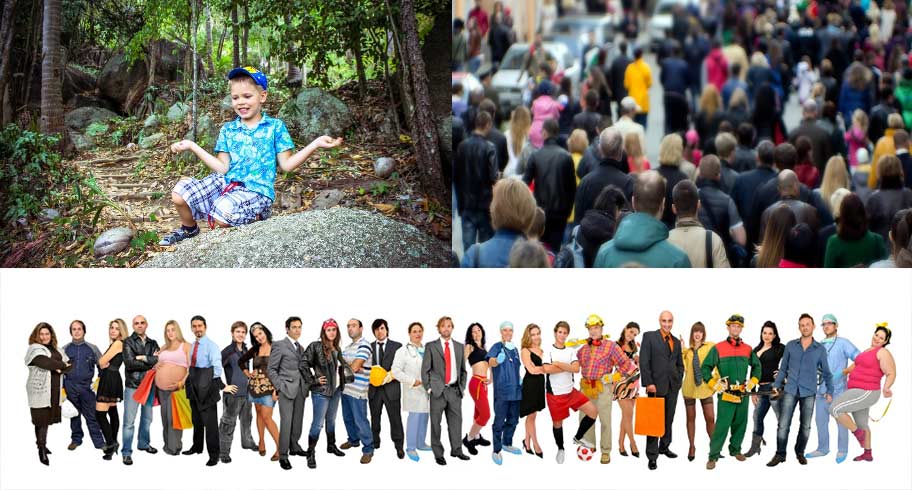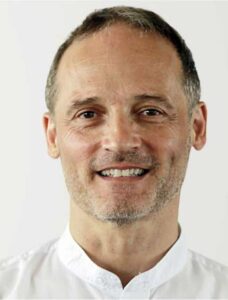Introduction to ecopsychology
Author: Marc Schmuziger
Ecopsychology encompasses and integrates disciplines with each other. From shamanism to philosophy and systems theory to psychology and ecology. In order to dissolve the dualism in the thinking of Western societies and to open the view on the unity of life. This supposed separation led us to alienate ourselves from nature and to cement a difference between nature and being human. But how can reconciliation with nature succeed in and around us? Ecopsychology would like to provide answers to this question.
Dear reader, I would like to begin my remarks with a little experiment:
Please let the following two questions take effect in you. Similar to a pebble falling into water and triggering ring-shaped ripples. Observe what kind of resonances arise from them:
- What kind of images do you see when you think of nature?
- What words or phrases resonate with you?
Give yourself some time to let the images, the words and the place of nature arise in you. And while doing so, keep your attention focused inward.

After this little excursion into the inner world, I would like to ask you to look at the following pictures and ask yourself to what extent they have a similarity with your image of nature. Have you seen in your picture a beautiful landscape, a forest, water or a wild animal?
But why not with people, or even people alone?

I admit it: my last question exposes the intent of the experiment. Because I assume that the inner images you saw are more likely to be from the first group. In any case, that would have been the case with me. I, too, carry within me the tendency not to experience myself as part of nature.
Although we are nature as much as nature itself, we usually don’t see it with or in us, but outside of us humans and outside the walls of our cities.
But how do we get there? After all, we consist of exactly the same basic components and function just as well according to the same laws of nature. Somehow, an inner mechanism seems to be at work within us that excludes us from nature. Ecopsychology addresses these and other questions, and I will also hint at a few answers to them in the course of this article, which I have taken from Michel Maxime Egger’s book, translated and edited by me, Care of the Soul – Healing the Earth. Introduction to Ecopsychology and reflect on them further.
THE ORIGIN OF ECOPSYCHOLOGY
The ecopsychological movement originated in the United States in the nineties and developed steadily in the Anglo-Saxon world. It combines approaches from philosophy, psychotherapy schools, ethology, spirituality, shamanism, indigenous and primitive wisdom, ecofeminism, systems theory, quantum physics and art. In this sense, it behaves openly as a discipline, overcoming the thinking in mutually isolated scientific “allotments” so dear to the analytical mind of the West. It lives its own paradigm in which the original, double dualism of nature/human as well as outside/inside is overcome to create an awareness of the unity of our reality.
Thus, we humans are nature to exactly the same degree as the nature around us. Nature is not outside of us, and the distinction of “inside and outside” is merely an illusion that our ego consciousness makes us believe.
We are part of the earth, which is an inseparable part of our existence.
The shift in consciousness that this entails can best be described as a shift from our current anthropocentrism to ecocentrism (“from ego to eco”), which deep ecologist John Seed explains in the following terms:
Anthropocentrism is as much as human-centered chauvinism. It resembles sexism when you replace the word “man” with “human race” and the word “woman” with “all other species” […].
When man digs deeper and sees through the layers of his anthropocentric hubris, a profound change in consciousness sets in. Alienation disappears. Man is no longer a stranger, he is no longer separate.
CARL GUSTAV JUNG – A PIONEER OF ECOPSYCHOLOGY
How could the ideas and movement of ecopsychology be better introduced than by the people who shaped it? In the following, four central figures will be introduced. They have strongly influenced ecopsychology, founded it, or still provide important impulses today. A few quotations from them should also give a picture of what ecopsychology is really about . And also how the salutary change of consciousness intended by it is to be understood.
We can consider Carl Gustav Jung as the actual original pioneer of ecopsychology. When he died in 1961, there was of course no ecopsychology yet. But Jung described early on the split in which Western man finds himself in relation to his inner as well as outer nature. Moreover, with his concept of the collective unconscious, he laid an important foundation for understanding the unconscious. Not only individually, but collectively – that is, in relation to all of humanity, including its cultural history. In his own way, Jung also conceived the idea of an ecological self, which was later further developed by deep ecology and taken up by ecopsychologists:
My ego does not extend only as far as my body reaches. It also reaches beyond it, encompassing all the things I have created that are around me.
Jung understands life as a unity, as a living continuum, and as a web in which all beings live together like cells in a body. Thus, it is also clear to him that man cannot exist without animals and plants. According to him, nature is beneficial for the soul and a source of regeneration.
The savages are not dirty – only we are dirty. {`…`} People who have become dirty due to too much civilization take a walk in the forest or bathe in the sea.
The splitting of man from nature has gone too far for Jung – both outside in the world and inside of us. He recognizes pathological traits in this split, which manifest themselves primarily in the race for materialism, in wars, and in the destruction of the planet.

FROM THE INDIVIDUAL TO THE COLLECTIVE
In this context, Macy likes to quote the Buddhist master Thich Nhat Hanh. When asked what it would take to save the world, he replied, “What we need to do most urgently is to listen within ourselves to hear the earth weeping.” Sensing and acknowledging this suffering also opens the space for solidarity and compassion. It opens the view to understand our lives in a larger historical context. As a “continuous stream of life on earth that has been flowing for more than three and a half billion years and has survived five mass extinctions.”
It is during this third phase that we can first understand that we are part of a whole. Even far more than the sum of its parts. The attitude of “power over,” where ownership and domination are authoritative, changes to a sense of “power for”. Where togetherness and cooperation are paramount. We understand that partnerships and collective intelligence are absolutely necessary to make possible what we are no longer able to do alone.
 About the author
About the author
Marc Schmuziger, lic. phil. (1960), musician, psychotherapist and publisher of taotime verlag. Translation and publication of books in the field of Eastern philosophy, psychology, ecology and children’s books.
This article appeared originally on the German Homepage of Tattva Viveka: Die Natur in uns




